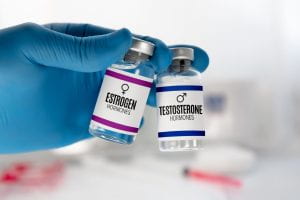
According to the U.S. Census Bureau, about 2.6 million Americans identify as transgender, meaning their gender identity is different from the sex assigned to them at birth.
When transgender people seek medical therapy, they most commonly receive gender-affirming hormone therapy, which involves taking hormones to develop physical characteristics that better match their gender identity. Feminizing hormone therapy can trigger the development of breasts, help redistribute body fat to the hips and thighs, and lead to thinning of facial and body hair. Masculinizing hormone therapy can lead to a deeper voice, the redistribution of body fat away from hips and thighs, increased body and facial hair, increased muscle mass, and changes to the menstrual cycle.
While hormone therapy most obviously impacts physical traits, research shows it has significant effects on psychological and social well-being.
A systematic review published this year in the journal Nature Human Behavior takes a comprehensive look at the psychosocial effects of gender-affirming hormone therapy. This is the first systematic review of its kind, and it’s especially important because data show that people who are transgender experience mental health problems – including depression, anxiety, and social isolation – at much higher rates compared to the general population.
The review – conducted by researchers at Amsterdam University Medical Centers and the University of Exeter – pulls together data from 46 journal articles. The studies were based on interviews, comparisons of people who took hormones and those who did not, and analyses of those taking hormone therapy over longer periods of time.
The report clearly demonstrates that gender-affirming hormone therapy reduces depressive symptoms and psychological distress in transgender people. The report also found that gender-affirming hormone therapy helps transgender people in key areas of psychosocial functioning, namely self-control and trust.
After reviewing the body of evidence, researchers noted that hormone therapy most often leads to reductions in distress among people who are transgender, rather than increases in positive emotional states. That is, it is more likely to alleviate feelings of depression, sadness, and isolation rather than promote positive feelings.
The research does not provide a clear picture about whether the benefits of hormone therapy result from chemical changes in the brain or from improved body image and autonomy in appearance – or both.
There is some evidence that gender-affirming hormone therapy improves quality of life, but those results are complicated by emotional changes that occur during therapy. In many studies, participants taking masculinizing hormone therapy experienced dampened emotions. At the same time, participants taking feminizing hormone therapy reported more mood swings, emotional imbalances, and increased emotional expressiveness. The research does not paint of clear picture of how existing gender stereotypes affect people taking gender-affirming hormone therapy. But researchers do know that these variables factor into participants’ reports on their overall quality of life.
While the systematic review pointed to some strong conclusions, the report also highlights many gaps in the research on gender-affirming hormone therapy: it is difficult to identify adequate control groups for randomized, controlled studies; study sizes tend to be small; and the studies involve transgender people who volunteer to participate, which could skew results.
The take-home message? Despite the gaps in the research, the evidence is clear: Gender-affirming hormone therapy reduces depressive symptoms and results in improved psychosocial functioning for transgender people.


